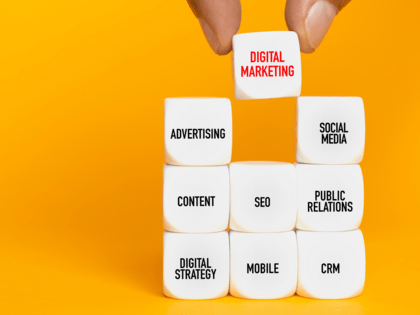
Are you struggling to scale your business growth? Many companies hit a wall when it comes to expanding their market presence and optimizing their marketing strategies. This is often due to a lack of senior marketing leadership, especially in small to mid-sized businesses that may not have the resources to hire a full-time Chief Marketing Officer (CMO).
Without CMO leadership, your business can suffer from:
- Without strategic direction, your marketing efforts can become disjointed and inefficient.
- This not only leads to wasted resources but also missed opportunities for growth.
- You know you need top-level marketing expertise to align your marketing strategies with your business goals, but the cost of a full-time CMO is steep, and the commitment is significant.
- This gap leaves your business vulnerable to competitors and slows down your potential to capture and expand your market share.
Enter the Fractional CMO – a flexible and cost-effective solution that brings C-level marketing expertise to your team without the full-time price tag. A Fractional CMO collaborates with your existing marketing team on a part-time basis, focusing on strategic planning, team alignment, and scalable growth strategies.
Here's how a Fractional CMO can supercharge your growth:
- Strategic Insight: They provide the strategic foresight needed to create effective, high-impact marketing plans that align with your business objectives.
- Scalability: With a Fractional CMO, you can scale your marketing efforts up or down based on business needs without the complexities of full-time hiring.
- Cost-Effective: You gain access to senior marketing expertise at a fraction of the cost of a full-time executive, making it an ideal solution for budget-conscious businesses.
- Fresh Perspective: Bringing an outsider’s perspective, a Fractional CMO can offer new ideas and innovations that challenge the status quo and drive growth.
By integrating a Fractional CMO into your leadership team, you can enhance your strategic marketing capabilities, refine your marketing efforts, and accelerate your business growth.
Ready to explore how a Fractional CMO can help your business soar?
Contact us today to discover how one of our fractional CMOs can tailor a marketing strategy that fits your unique needs and goals.
Below, we'll delve deeper into the world of Fractional CMOs, showcasing their transformative potential.
What is a Fractional CMO?
In the ever-changing business world, the idea of a "fractional CMO" is making a big impact. This unique position combines the expertise of a seasoned marketing executive with the flexibility of part-time hours. It provides a cost-effective solution for companies that are unsure about hiring a full-time chief marketing officer. Let's dive into how a fractional CMO can enhance your marketing strategy and drive growth.
The Role of a Fractional CMO
A fractional CMO, or fractional chief marketing officer, serves as a part-time marketing leader who brings years of experience and industry knowledge to your team. Unlike full-time CMOs, fractional CMOs work on a contract basis, offering their services for a few days a week or on a project basis. This setup helps startups and growing companies gain access to top-tier marketing talent without the hefty price tag of a full-time executive.
Key Responsibilities

- Strategic Planning and Leadership: Fractional CMOs provide strategic direction to your marketing team, ensuring that all marketing efforts align with your business objectives. They spearhead the development of a comprehensive marketing plan that includes demand generation, digital marketing, content marketing, SEO, and social media strategies.
- Optimizing Marketing Campaigns: With a focus on metrics and KPIs (key performance indicators), fractional CMOs optimize marketing campaigns to maximize ROI. Their methodology involves thorough market research, analyzing data, and a hands-on approach to adjusting strategies based on performance.
- 3. Building and Scaling Teams: A good fractional CMO excels in building robust marketing departments. They can guide in-house marketing teams, collaborate with marketing agencies, and manage freelancers to ensure a cohesive effort toward marketing goals.
- Cost-Effective Expertise: Fractional CMO services are a cost-effective alternative to hiring a full-time CMO. Companies can save money on marketing by outsourcing this role, allowing them to invest in other important areas of their business.
- Implementation of Advanced Tools: Leveraging the latest in automation and digital marketing tools, fractional CMOs implement systems that enhance efficiency and track performance meticulously. These tools help in fine-tuning marketing initiatives and scaling up operations without substantial increases in overhead.
- Customized Marketing Efforts: Every business has unique needs, and fractional CMOs tailor their strategies to meet these specific requirements. From crafting a unique brand strategy to setting up a targeted go-to-market strategy, they ensure that all aspects of your marketing efforts speak directly to your target audience.
How Fractional CMOs Differ From Full-Time CMOs
The roles of fractional CMOs and full-time CMOs both aim to drive growth and enhance the effectiveness of marketing efforts, but their approaches, commitments, and impacts on a business vary significantly. Understanding these differences is crucial for businesses, especially startups and small to mid-sized companies, as they decide which marketing leadership model best fits their needs.
1. Engagement and Cost Structure
The most apparent difference lies in their engagement and cost structure. A fractional CMO, essentially a part-time marketing executive, offers services on a contractual, often part-time basis which is cost-effective and flexible. This arrangement is ideal for businesses that require experienced marketing leadership but are not ready or do not have the resources to afford a full-time chief marketing officer. In contrast, a full-time CMO involves a significant, long-term financial commitment, including a full salary, benefits, and often incentives.
2. Scope of Work and Strategic Focus
Fractional CMOs typically work with multiple clients simultaneously, bringing a broad range of industry knowledge and innovative, tested strategies from various sectors. This exposure allows them to implement high-impact marketing strategies and go-to-market strategies that are informed by a diverse set of experiences and successes. On the other hand, a full-time CMO focuses solely on one organization, which enables deep immersion in the brand’s challenges and opportunities but can sometimes limit the diversity of strategic influences.
3. Flexibility and Scalability
Fractional CMOs offer unparalleled flexibility—they can scale their involvement up or down based on the business’s evolving needs, market conditions, or budget constraints. This scalability makes it easier for companies to adapt quickly to market changes or internal shifts without the cumbersome process of restructuring a full-time role. Full-time CMOs, while highly dedicated, may not offer the same level of agility due to the fixed nature of their employment.
4. Marketing Campaigns and Initiatives
When it comes to implementing marketing campaigns and initiatives, a fractional CMO has the ability to leverage a wide network of freelancers, agencies, and industry contacts to execute diverse marketing efforts, from digital marketing to content marketing and SEO. They are adept at coordinating these resources to maximize efficiency and effectiveness, often integrating advanced automation tools and methodologies to track KPIs and metrics rigorously. A full-time CMO might manage these elements in-house or with dedicated team members, potentially increasing internal capabilities but also often increasing costs.
5. Short-Term vs. Long-Term Commitment
A fractional CMO is typically focused on achieving specific, short-term goals aligned with strategic marketing plans and business objectives. Their work is often project-based with clear deliverables, designed to establish frameworks and strategies that the in-house team can run with over time. In contrast, a full-time CMO's role is inherently long-term, aimed at steadily building and nurturing the company’s marketing function, leadership, and brand strategy over many years.
6. Experience and Specialization
The requirement for a good fractional CMO is extensive experience and a track record of success across various platforms and market environments. They must quickly understand a new company’s marketing needs and craft strategies that can be swiftly implemented for immediate impact. Full-time CMOs also bring years of experience, but their ongoing engagement allows them to develop specialized expertise tailored to the specific industry or market niche of the company.
Choosing between a fractional and a full-time CMO depends largely on your company's marketing goals, budget, and stage of growth. For many businesses, fractional CMOs provide a strategic, flexible, and cost-effective solution that allows access to top-tier marketing talent without the hefty overhead associated with a full-time executive. This makes the fractional CMO an attractive option for companies aiming to enhance their marketing efficacy while maintaining budget control and strategic agility.
Fractional CMO Cost
How Much Does a Fractional CMO Cost Versus a Full-Time CMO?
So, with this all in mind, let’s dive into maximizing impact while safeguarding your budget. How much does a fractional CMO cost? A fractional CMO can cost anywhere from $150 to $500 per hour, with most falling within the $200 to $375 range. At 20 hours per month, for example, that's $4,000 to $7,500 per month in the standard pricing range.
Cost-Benefit: Fractional CMO versus Full-Time Employee (FTE)
As far as value analysis, the deeper answer to "what does a fractional CMO cost" lies in understanding the cost-benefit equation of a full-time CMO versus a Fractional CMO, and the stark contrast between each option.
Imagine two scenarios: in one, you recruit a full-time CMO, saddling yourself with a hefty salary, extensive benefits, and office overhead. On the other hand, you collaborate with a fractional CMO, gaining high-level expertise without the burden of a full-time position. The financial difference is immediately striking, with Fractional CMOs costing as little as 75% of a full-time CMO's annual salary.
Fractional CMO | Full-Time CMO (FTE) | |
|---|---|---|
| One Person | $60K-$150K per year 1 part-time CMO | $200K-$400K+ per year 1 full-time CMO |
| Add in a Team | $120K-$250K per year Fractional CMO + supporting fractional marketing team | $500K-$2M+ per year Full-time CMO plus full-time marketing team hires |
| Benefit Analysis | + Low Overhead: No benefits, PTO, office, etc. + Faster: Able to quickly adapt to new environments. + Existing Team: Fractional CMOs often bring vetted talent with them, or an entire fractional marketing team. + Diverse Expertise: Specialized, high-level strategic expertise across diverse companies and industries. + Less Risk: Don't like the fractional CMO you hired? They are usually on contract and can be easily and quickly replaced. | - Additional Costs: Benefits, payroll taxes, PTO, employee infrastructure. - Slower: Traditional CMOs are less agile and not as scrappy. - No Existing Team: May have to hire new FTEs which is both expensive and incredibly risky. - Less Diverse Expertise: Career CMOs often have been more isolated in their experiences. - More risk: Hiring a full-time CMO comes with all the same risks of hiring a new employee. |
| Proven ROI | Yes | Maybe |
| Onboarding Time | Days | Months |
The real-world benefits of this fractional model are undeniable. Understanding the costs associated with hiring a fractional CMO is crucial for businesses planning to leverage this flexible executive role.
Factors Influencing the Cost
Several key factors can influence the cost of hiring a fractional CMO:
- Industry: Certain industries might demand specific knowledge or experience that can command a premium. For example, technology or pharmaceutical industries may require higher rates due to the specialized nature of their markets.
- Location: Geographic location can also affect pricing, with fractional CMOs in major metropolitan areas or high-cost-of-living regions typically charging more.
- Experience: The depth and breadth of experience a fractional CMO brings to the table can significantly impact their rates. Those with extensive track records of success in similar roles or industries might demand higher fees.
Comparison with the Cost of Hiring a Full-Time CMO
Hiring a full-time CMO involves a significant financial commitment, including a competitive salary, benefits, bonuses, and potentially equity, which, including overhead, can total anywhere from $200,000 to over $400,000 annually. In contrast, the cost of a fractional CMO is considerably lower, making it a cost-effective option for small to mid-sized businesses or startups. This role provides access to strategic marketing leadership without the full overhead associated with full-time hires.
How to Budget for a Fractional CMO
Budgeting for a fractional CMO involves several steps:
- Define the Scope of Work: Clearly outline what you expect the fractional CMO to achieve. Understanding the scope will help determine how many hours or what part of a retainer might be necessary.
- Assess Your Financial Resources: Consider your overall budget for marketing and how a fractional CMO fits into this. Ensure that the cost aligns with your company's financial capabilities and overall strategic objectives.
- Consider the ROI: Evaluate the potential return on investment that a fractional CMO could deliver through enhanced marketing strategies, better brand positioning, and improved ROI on marketing spends.
- Plan for Flexibility: Since one of the benefits of hiring a fractional CMO is flexibility, set aside a portion of your budget to accommodate changes in the business environment or shifts in strategy that may require more of your fractional CMO's time.
Investing in a fractional CMO can offer a significant strategic advantage, especially when full-time executive hiring might be beyond your current budget. By understanding the costs and planning appropriately, businesses can make the most of this flexible, cost-effective resource to drive their marketing efforts and achieve broader business goals.
The O8 Difference: Fractional CMO + Fractional Team
To be clear, this is an optional model and not for everyone. We do encourage you to hire only a fractional CMO, without a fractional team behind them, if that's what's best for you. However, a fractional CMO + fractional team is a true powerhouse for those who can afford it.
At our company, we recognize that effective marketing requires more than just strategic leadership; it requires a team that can execute that strategy flawlessly. This is why we often pair our fractional CMOs with a fractional marketing team, ensuring our clients benefit from a comprehensive, cohesive marketing effort that's both dynamic and efficient. Here are some key advantages of this approach:
- Integrated Team Dynamics
You don't just get a fractional CMO; you receive the support of an entire team that is already accustomed to working together. This proven team is ready-to-go, with established workflows, communication protocols, and a unified approach to marketing. This integration ensures that strategies devised by the CMO are implemented quickly and effectively, with a team that understands the nuances of these strategies. - Single Point of Contact
To streamline communications and ensure seamless integration with your internal staff, our service includes a single point of contact for account management. This approach not only simplifies the coordination of activities and reporting but also enhances the clarity and effectiveness of communications, allowing for quicker adjustments and more focused strategic alignment with your business goals. - Expanded Expertise and Specialization
With a full fractional marketing team, you benefit from a broader range of skills and specializations that can be costly to obtain in-house. From digital marketing experts and content creators to SEO specialists and social media strategists, each team member brings specific expertise that complements the overarching strategy developed by the fractional CMO. This diversity allows for more innovative, comprehensive, and effective marketing solutions tailored to your business needs. - Cost-Effective Resource Allocation
Hiring a full-time marketing department can be prohibitively expensive, especially for startups and small businesses. Our fractional team model provides a cost-effective solution, offering top-tier marketing talent at a fraction of the cost of full-time hires. This allows you to allocate more resources to other critical areas of your business, like product development or market expansion, while still benefiting from professional marketing guidance. - Scalability and Flexibility
As your business grows, your marketing needs will evolve. Our fractional marketing teams are built to scale with you. Whether you need to ramp up efforts for a product launch or scale back to focus on refining your strategy, our teams adjust their level of support to meet your changing needs without the need to hire or lay off staff. - Rapid Deployment and Implementation
The agility of a fractional team means that once decisions are made, implementation can begin immediately. There's no lag time waiting for the hiring and ramp-up of new staff members. This quick action can be crucial in taking advantage of market opportunities and responding to competitive pressures. - Continual Learning and Improvement
Fractional teams are continuously updating their skills and knowledge to stay on the cutting edge of marketing trends and technologies. This commitment to continual learning means that the strategies and tools they use are always at the forefront of marketing innovation, giving your business a competitive edge.
Our fractional marketing team, working under the strategic direction of our experienced fractional CMOs, provide a powerful, flexible, and cost-effective way to drive your business's growth. By leveraging this integrated approach, you gain access to a breadth of skills and a level of coordination that can transform your marketing efforts and set your business on a path to success.
The Benefits and Typical Responsibilities of a Fractional CMO
What Are The Benefits of a Fractional CMO?
The decision to bring a fractional CMO into your organization can be transformative — not just for startups and small businesses, but any business looking to make a significant impact in their markets without the financial burden of a full-time executive. Here are some key benefits of engaging a fractional chief marketing officer:
- Access to Expertise and Experience: A fractional CMO brings a wealth of experience and specialized knowledge to your company. These professionals typically have a background in leading successful marketing strategies across various industries. This level of expertise helps in quickly identifying the best paths to market and avoiding common pitfalls that can derail marketing efforts.
- Cost-Effectiveness: One of the most appealing aspects of hiring a fractional CMO is the cost efficiency. Instead of committing to the salary, benefits, and other compensation typically associated with a full-time C-suite hire, you pay only for the time the CMO works. This arrangement frees up resources that can be redirected towards other critical growth activities, such as product development or market expansion.
- Scalability: As your business needs change, a fractional CMO can adjust their involvement to match. During periods of intense growth or pivotal marketing campaigns, they can ramp up their hours to steer efforts effectively. Conversely, during slower periods, they can reduce their hours to help you manage costs more effectively.
- Objective Insight and Fresh Perspectives: Being partly outside the day-to-day operations, fractional CMOs bring an objective viewpoint that can be crucial for unbiased decision-making. Their fresh perspectives can invigorate your marketing efforts and help you see opportunities and solutions that might not be apparent from the inside.
- Speed to Execution: Fractional CMOs are accustomed to jumping into different environments and getting up to speed quickly. This ability means they can make impactful changes faster than it might take to hire and onboard a full-time CMO. For companies looking to quickly adapt to market changes or capitalize on new opportunities, this rapid deployment can be a significant advantage.
- Flexibility: The flexibility offered by a fractional engagement is particularly beneficial for companies experiencing fluctuating market conditions. A fractional CMO can navigate these changes without the long-term commitments required by traditional employment, adapting their strategies and focus as your business evolves.
- Enhanced Team Dynamics: Fractional CMOs often act as mentors to in-house marketing teams, improving skills and providing guidance based on proven methodologies and successful strategies. This mentoring can enhance team performance and morale, driving better results across all marketing initiatives.
- Implementation of Advanced Marketing Technologies: With their finger on the pulse of the latest marketing trends and technologies, fractional CMOs can implement advanced tools and platforms that optimize marketing efforts and generate better insights through data. This strategic use of technology enhances efficiency and effectiveness in reaching and engaging your target audiences.
Incorporating a fractional CMO into your strategic planning can provide the leadership and insight needed to enhance your marketing capabilities without overstretching your budget. The benefits extend beyond mere cost savings, impacting your organization through strategic expertise, flexible engagement, and dynamic market responsiveness. For companies aiming to drive growth and refine their marketing strategies, a fractional CMO might just be the key to unlocking their full potential.
Typical Responsibilities of a Fractional CMO
A fractional CMO plays a pivotal role in steering the marketing function towards success, blending strategic marketing leadership with practical execution. Here are the key responsibilities typically handled by a fractional chief marketing officer:
Developing and Refining Marketing Strategies

A fractional CMO is tasked with crafting and refining a comprehensive marketing strategy that aligns with the unique needs of your business. This involves a thorough analysis of market research and existing data to build a robust marketing plan that targets achievable growth. Whether it's enhancing your brand strategy, improving your go-to-market strategy, or optimizing your pricing models, a fractional CMO leverages their industry knowledge and years of experience to drive results.
Overseeing Marketing Campaigns and Digital Initiatives
From traditional marketing campaigns to digital marketing efforts, a fractional CMO oversees the creation and implementation of all marketing initiatives. They work closely with the marketing team, ensuring that content marketing, SEO, social media, and demand generation efforts are well-coordinated and executed to meet business objectives. This often involves working with both in-house staff and outsourced freelancers or agencies to maximize the effectiveness and reach of marketing efforts.
Measuring and Reporting on Marketing Performance
One of the key roles of a fractional CMO is to establish KPIs and use metrics to track the success of marketing efforts. By implementing automation tools and other digital technologies, they provide precise, real-time reporting that helps businesses assess the effectiveness of their marketing campaigns and adjust strategies as necessary. This data-driven approach ensures that every marketing decision is guided by solid evidence aimed at boosting profitability.
Leading and Mentoring the Marketing Team
A fractional CMO not only leads the marketing department but also plays a crucial role in mentoring team members. By sharing their expertise and providing professional development opportunities, they help build a skilled, knowledgeable marketing team capable of executing complex marketing strategies. This leadership is vital for maintaining a high-performance team that can sustain the ongoing marketing efforts of the company.
Aligning Marketing Goals with Business Objectives
Perhaps the most crucial responsibility of a fractional CMO is to ensure that all marketing goals are in perfect alignment with the broader business objectives. Through strategic planning and regular collaboration with other C-suite executives, they guarantee that the marketing function supports overall business goals, driving growth and ensuring the marketing investments are cost-effective.
The role of a fractional CMO is complex and multifaceted, requiring a balance of strategic foresight and tactical expertise. By engaging a fractional CMO, companies benefit from top-tier marketing leadership that is both affordable and effective, tailored to meet the dynamic needs of growing businesses. Whether it's steering digital transformation, enhancing messaging, or pioneering new marketing methodologies, a good fractional CMO’s work ensures that your marketing efforts are not just complete, but compellingly effective.
Ready to explore how a Fractional CMO can help your business soar?
Contact us today to discover how one of our fractional CMOs can tailor a marketing strategy that fits your unique needs and goals.
How to Determine if a Fractional CMO is Right for Your Business
Is a Fractional CMO Right for Your Business?
Deciding whether to bring on a fractional CMO requires a thorough evaluation of your current business needs, marketing goals, and the capabilities of your existing team. Here’s a detailed guide to help you determine if a fractional CMO is the right fit for your organization.
Signs That Your Business Could Benefit from a Fractional CMO

- Growth Plateaus or Declines: If your business has hit a plateau or seen a decline in growth, a fractional CMO can inject new life into your marketing efforts with fresh strategies and proven methodologies that drive growth.
- Inadequate Marketing Leadership: For startups and smaller businesses that lack experienced marketing leadership, a fractional CMO offers the expertise needed to guide your marketing team without the cost of a full-time executive.
- Rapid Scaling Up: If your business is scaling up, you'll need strategic marketing to match your pace. A fractional CMO can quickly adapt your marketing strategy to support this growth, focusing on KPIs, market research, and strategic planning to ensure alignment with your business objectives.
- Need for Specialized Skills: If your current campaigns lack the latest digital marketing or SEO strategies because of capability gaps, a fractional CMO with a solid track record in these areas can fill those gaps efficiently.
Evaluating Business Needs and Marketing Goals
- Strategic Assessment: Consider your long-term business objectives and assess whether your current marketing strategy aligns with them. A fractional CMO can offer significant input in strategic planning, ensuring your marketing efforts complement overall business goals.
- Marketing ROI: Analyze the return on investment (ROI) of your existing marketing initiatives. If your marketing efforts are not yielding the desired results, it might be time to bring in a fractional CMO to overhaul your marketing plan and improve profitability.
- Market Position and Competition: Evaluate your position in the market relative to your competitors. A fractional CMO with industry knowledge can perform detailed market research and adjust your marketing strategy to better position your brand.
Assessing Current Marketing Capabilities and Gaps
- Skill Gaps: Review the skills of your current marketing team. If there are significant gaps, especially in high-impact areas like digital marketing, content marketing, or social media, a fractional CMO can help bridge these gaps with their expertise and by guiding team members.
- Resource Allocation: Determine if your marketing department is overextended or lacking in specific functions. A fractional CMO, often supported by a network of freelancers and outsourced agencies, can provide the additional resources needed to support your in-house team effectively.
- Technology and Automation: Assess the technology stack your marketing team is currently using. A good fractional CMO can bring a depth of experience in automation and digital tools that optimize marketing campaigns and data analytics, enhancing your marketing function's overall efficiency.
Choosing to hire a fractional CMO involves assessing not just the immediate marketing needs but also the strategic direction of your company. If your analysis points to gaps in strategic leadership, marketing expertise, or technological capabilities, and there's a clear alignment with cost-effective solutions, then engaging a fractional CMO could be a transformative decision for your business. This role not only fills leadership gaps but also enhances your entire marketing approach, ensuring your business is positioned for both immediate recovery and sustained growth.



